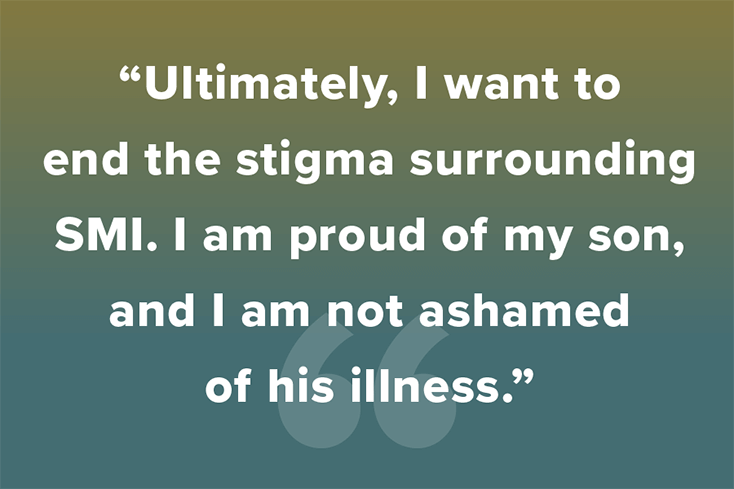August 17, 2023
By Linda Carranza

While I have lived with anxiety and depression for more than 30 years, my story is really about my son. I raised my boys, who are now 19 and 26 years old, alone. I always did my best for them. And when serious mental illness (SMI) touched our family, we faced a challenging situation.
Four years ago, my oldest son was diagnosed with schizophrenia, post-traumatic stress disorder (PTSD) and depression. I felt like I had failed him as a mother; when you hear schizophrenia, you often think of people wandering the streets and talking to themselves. That is not the life I wanted for my child.
My son refused help. He was in a constant state of psychosis and confined himself to his room. On the rare occasions he left his room, he locked the door behind him (and I didn't have a key). But I refused to give up on my son. I researched and read up on his mental health conditions so I could gather the necessary tools to help him get better. His condition, however, continued to worsen. In all honesty, our situation was onerous and terrifying. Both my younger son and I were scared for his brother and for the future. Something had to change.
Others advised us to “kick [my son] out” of the home. This suggestion did not sit well with me. Why would I kick my child out? He was not hurting us; he was trapped in a painful and stressful medical situation. Would they say to kick him out if he had brain cancer? That is when I realized that our journey was complicated beyond managing my son’s symptoms; we were also battling intense stigma surrounding SMI.
One day I opened the door to my son’s room and found what looked like a scene from a movie. Walls were covered with newspaper clippings writings that didn't make sense, and he was sleeping in his closet. I cleaned his room and threw everything away. When my son saw what I had done, he became distressed and told me that he was helping the FBI solve cases. When he calmed down, he told me that his information couldn’t be thrown in the trash — or his enemies would “grab it.” I called the police because I knew my son was in a mental health crisis and needed to be hospitalized. Officers spoke with him but reported that there was nothing they could do in this situation. I cried in defeat.
One officer, however, convinced by son to go a behavioral health center that night. When I watched him walk away, I was heartbroken that it had to come to this. I had so many questions. He had been so "normal" before. What happened to him?
After my son’s 72-hour hold, I picked him up and told him he had to be compliant with his medication in order to come home. I told him that I wanted my son back. But upon his return home, he would continue to skip his meds. I continued to research. I found information about an injection that had demonstrated some success. Why hadn’t we been given that option before? I coordinated with my son’s doctor so we could give the injection a try. This is when I realized that I would have to advocate for my son’s health.
Thanks to this injection, in combination with an oral medication regimen, I got my son back. He is thriving. Managing his symptoms will be a lifelong task, but he hasn't experienced psychosis in almost one year!
The reason I am sharing my story is to give parents in my situation some hope. This is a daunting challenge, but there is help available. And we have to be patient and empathetic; our children didn't choose to live like this. This is an illness and that deserves a compassionate, medical response.
Ultimately, I want to end the stigma surrounding SMI; I am proud of my son! I am not ashamed of his illness, and if we could spread accurate information about this illness, it would no longer be taboo. I hope those who are in a similar situation will join me as we spread awareness and turn passion into action.
We’re always accepting submissions to the NAMI Blog! We feature the latest research, stories of recovery, ways to end stigma and strategies for living well with mental illness. Most importantly: We feature your voices.
LEARN MORENAMI HelpLine is available M-F, 10 a.m. – 10 p.m. ET. Call 800-950-6264,
text “helpline” to 62640, or chat online. In a crisis, call or text 988 (24/7).